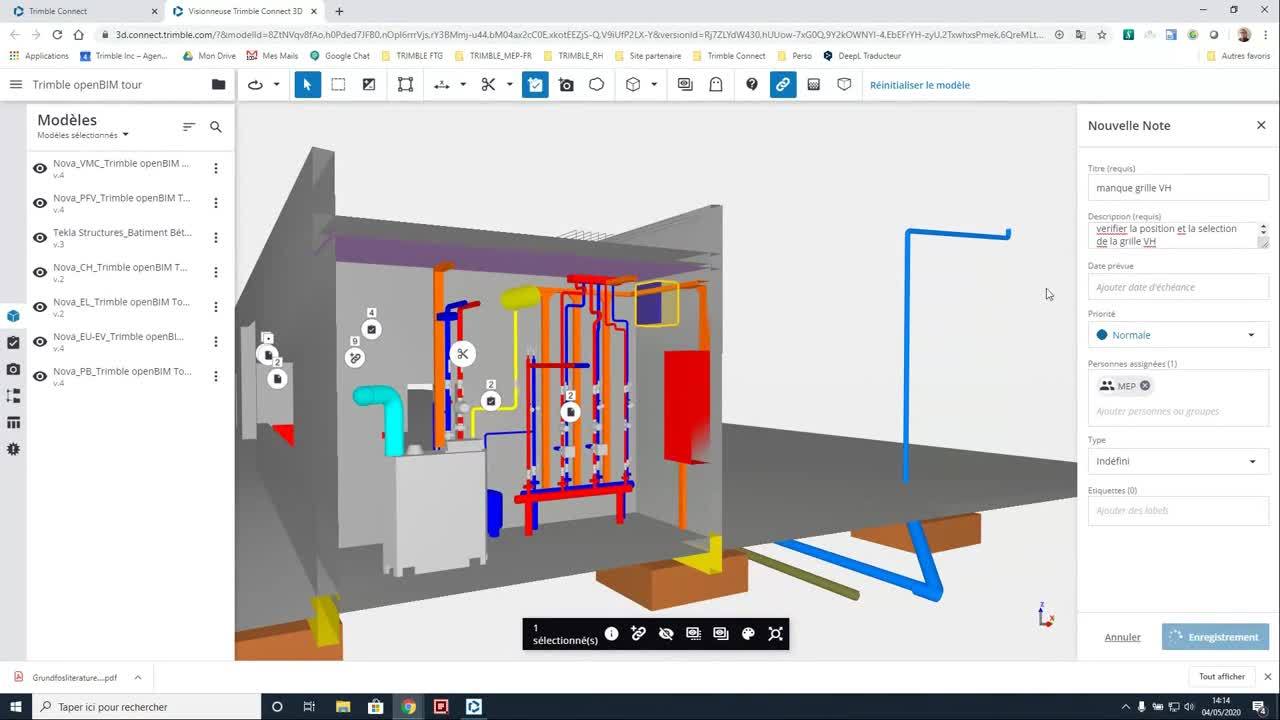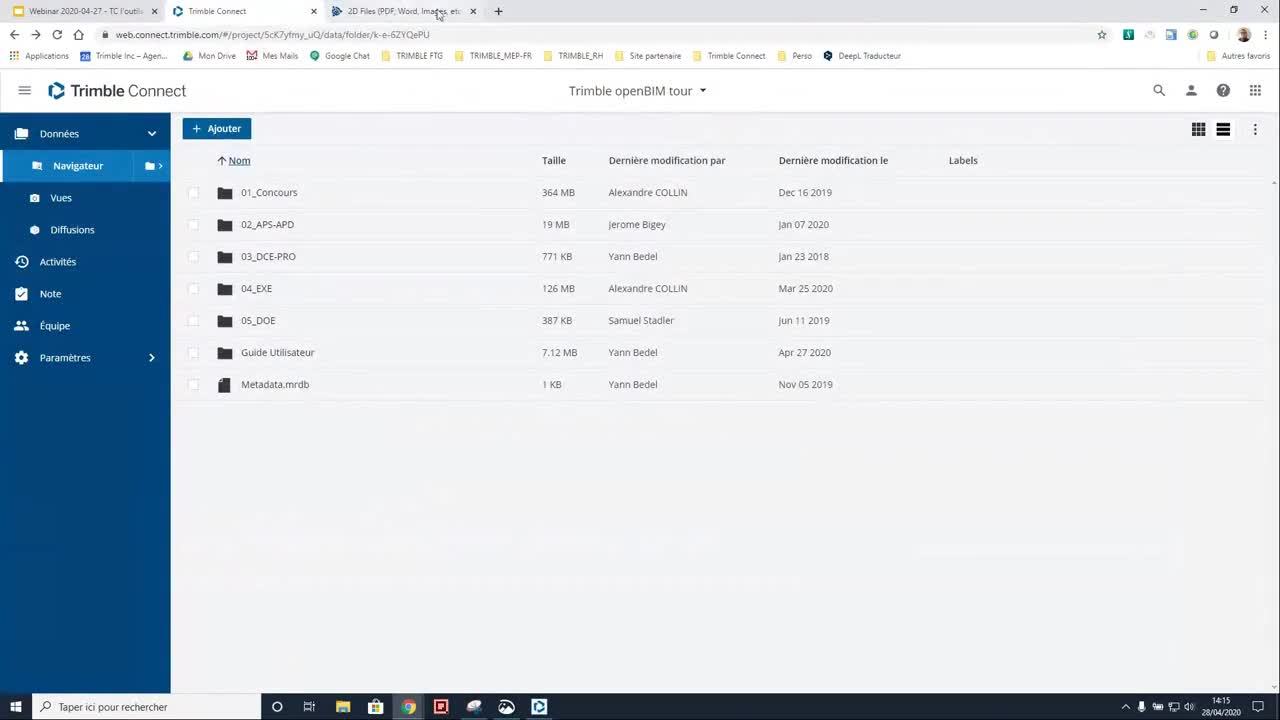The lines between reality and fiction are finally disappearing on construction sites. A new hard hat solution for Microsoft HoloLens is changing the way construction professionals design, build, and operate. You don’t want to miss this.
You’ve probably heard of augmented reality (AR) and virtual reality (VR), but there’s another form of reality taking over construction sites. It’s called mixed reality.
What is mixed reality?
Mixed reality is a technology that merges real and virtual worlds to create brand new environments where physical and digital components can interact simultaneously. It’s “mixed” reality because it encompasses both virtual and real environments via immersive technology, letting users see the existing space overlaid with holographic data from a 3D model.
Mixed reality is transforming the way construction companies consume and interact with information. A recently released solution combines both hardware and software to enable the collaboration of both on-site and off-site teams, so crews can see exactly what task to perform — with instantaneous feedback.
But the benefits go beyond the real-time sharing of information.
We wanted to see the hype in action, so we went on-site and let a few workers try the Trimble Connect app for Microsoft HoloLens mixed reality glasses for the very first time.
Here's what happened.
"This is exactly what I'm seeing in the office, but you can actually get real life, which is great for a lot of remodels, especially hospitals. A lot of times, we can't even see what's already been built in a hospital, so being able to walk through with what we do vs. what they already have is great."
How does Microsoft HoloLens mixed reality hardware and software work together?
Microsoft HoloLens is a mixed reality product that includes specialized components and a custom holographic technology processing unit, allowing people to go beyond a screen and into a part virtual, part real, world. This is transforming the way people are communicating, creating, collaborating, and even building.
Trimble’s Hard Hat Solution for Microsoft HoloLens leverages the benefits of mixed reality into areas where increased safety requirements are mandated. The relationship between hardware and software is strong, as the glasses are integrated with a holographic computer, which is all fitted safely and securely on an industry-standard hard hat.
The all-in-one hard hat solution
The HoloLens is fitted inside of the hard hat so that workers can begin to experience the mixed reality environment— all while staying ANSI-compliant.
Microsoft HoloLens added to a construction hard hat
The components come together to form the Mixed Reality Hard Hat Solution.
The software, Trimble Connect for HoloLens, improves building coordination by combining models from multiple stakeholders such as structural, mechanical, and electrical trade partners. It provides for precise alignment of holographic data on a 1:1 scale on the job site, so workers can review models in the context of the physical environment.
How is mixed reality improving construction?
Mixed reality is improving construction by providing precise alignment of holographic data on the job site via hard hat-mounted hardware. This allows workers to see their models overlaid in the physical environment, enabling more precise collaboration and project coordination.
Predefined views further simplify in-field use with quick and easy access to immersive visualizations of the designed 3D data. This way, workers can leverage mixed reality to compare plans against work completed. Advanced visualization extends the ability for users to view assigned tasks and capture data with onsite measurement tools. This reduces human error, making projects much more efficient.
Who is using mixed reality in construction today?
Although mixed reality seems rather new in construction, the technology that’s out in the market today has been used by quite a few companies for years now.
GA Smart Buildings was the first company in France to deploy the Trimble Connect for HoloLens solution. Their Batiment H office building is a 3,300 square meter structure at the Parc de la Plaine in Toulouse, France. Some of the elements were prefabricated in a factory of the GA group and then transported onsite for assembly. One of the challenges was maintaining the utmost quality, as late identification of quality issues can result in delays, cost overruns, and reduced customer satisfaction. Since most onsite quality control processes involve obtaining and interpreting 2D documents, the risk of human error is often high. BIM technology and detailed 3D models help improve this quality control during the design stage, but on-site utilization can still remain limited. Knowing this, GA was looking for additional technology to make the most out of their BIM workflow. They wanted to reduce the risk of subjective error-prone interpretation and decided Trimble Connect for HoloLens was the right solution.
They developed mixed reality-based workflows, focusing on on-site quality control processes, enabling remote collaboration. Their goal was to improve the efficiency of the on-site quality control process and achieve early building commissioning. Special attention was given to the quality control of MEP systems and cast in place concrete.
“Trimble Connect for HoloLens enables us to go beyond the constraints of a 2D screen. Superimposing the digital model on the physical environment provided a clear understanding of the relations between the 3D design model and the actual work on sidesite.”
-- Olivier Pellegrin, BIM Manager, GA Smart Building
Having the ability to visualize BIM models superimposed on the actual environment allowed easy identification of design-to-build discrepancies, precision positioning of equipment, and near real-time quality control. GA even reported that with real-3D at a 1:1 scale, the mixed reality technology allowed for faster in-context decision-making, improving communication between stakeholders.
The Trimble Connect platform gave the team a location-based task list with model mark-ups aligned to the physical world, ensuring that issues were processed and reviewed in context. This shared experience further facilitated efficient group discussion between the onsite crew and remote experts, saving travel time and shortening the decision-making process.
“Using Trimble Connect for HoloLens for near real-time quality control, the on-site team identified and resolved potential issues avoiding significant schedule delays and cost overruns.”
-- Rémi Visiere, Head of R&D and Innovation, GA Smart Building
Mixed reality can transform the way construction companies consume and interact with information. This technology enables the education of on-site teams so they know exactly what task to perform and are provided feedback instantaneously. The benefits go well beyond real-time sharing of information. Mixed reality can shorten project schedules, reduce cost, eliminate rework, and support additional workflows like on-site assembly, progress tracking using 4D models, and even asset management.
Trimble Connect for HoloLens is available now through the Microsoft Windows App Store. A free trial option is also available, enabling integration with HoloLens. The paid subscription supports premium functionality, such as precise on-site alignment, collaboration, and measurement tools— all for less than a cup of coffee every day.
Trimble’s Hard Hat Solution for HoloLens is expected to be available in the first quarter of 2018. To learn more, visit mixedreality.trimble.com.
















